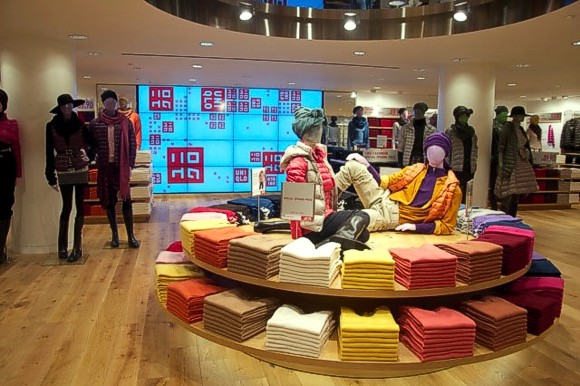UNIQLO Joins Other Global Fashion Brands In Greenpeace’s Fashion Detox Commitment
 April 4, 2013
April 4, 2013  Kyriaki (Sandy) Venetis
Kyriaki (Sandy) Venetis UNIQLO, a brand and retail chain known for its casual comfortable style, has just become part of Greenpeace’s Detox Commitment Campaign, along with five other brands – Comptior des Cotonniers, g.u., Helmut Lang, Princesse tam tam, and Theory – all from the Japanese global design manufacturer Fast Retailing.
 Photo courtesy of UNIQLO.
Photo courtesy of UNIQLO.
On April 23, 2011, Greenpeace released a report – Dirty Laundry 2: Hung Out to Dry - Unraveling the toxic trail from pipes to products – which found that products purchased as samples at UNIQLO stores in Moscow, Tokyo, and Hong Kong were found to contain hazardous chemicals known as nonylphenol ethoxylates (NPEs).
The U.S. Environmental Protection Agency explains that, “NPEs are nonionic surfactants that are used in a wide variety of industrial applications and consumer products. Many of these, such as laundry detergents, are ‘down-the-drain’ applications. Some others, such as dust-control agents and deicers, lead to direct release to the environment.
“NP and NPEs have been found in environmental samples taken from freshwater, saltwater, groundwater, sediment, soil, and aquatic biota. NP is persistent in the aquatic environment, moderately bioaccumulative, and extremely toxic to aquatic organisms.
“NP has also been detected in human breast milk, blood, and urine, and is associated with reproductive and developmental effects in rodents. NP has also been shown to exhibit estrogenic properties in in vitro and in vivo assays. NP’s main use is in the manufacture of NPEs.”
Last November, Greenpeace released another report – Toxic Threads - The Big Fashion Stich-Up – which revealed the results done on 141 clothing items and exposed the link between textile manufacturing facilities using hazardous chemicals and the presence of chemicals in the final products.
One of the key findings was that all tested brands had at least several items containing NPEs, with the highest concentrations at 1,000 parts per million (ppm), in clothing items from Zara, Metersbonwe, Levi’s, C&A, Mango, Calvin Klein, Jack & Jones, and Mark & Spenser.
Other chemicals identified in the Toxic Threads report included high levels of toxic phthalates and traces of a cancer-causing amine from the use of certain azo dyes. The items tested were manufactured mainly in the Global South (the nations of Asia, Africa, and Latin America) included jeans, trousers, t-shirts, dresses and underwear designed for men, women and children, and were made from both artificial and natural fibers.
Last month, Fast Retailing committed to the Greenpeace Detox Solution, with the company saying that it “is committed to achieving zero discharge of all hazardous chemicals from the whole (product) lifecycle, including all production procedures associated with the manufacture and using of its products by 01 January 2020.”
Fast Retailing said that starting this month, it would “begin the public disclosure of hazardous chemicals in its supply chain via full facility transparency … of chemical-by-chemical use and discharge data.”
The Fast Retailing hazardous chemical elimination policy will include the removal of Perfluorocarbons (PFCs) and Alkylphenol ethoxylates (APEOs).
Greenpeace explains that, “PFCs are manmade chemicals widely used by the industry for their non-stick and water-repellent properties. In the textile industry, they are used to make textile and leather products both water and stain-proof.”
Fast Retailing says it plans to eliminate all PFCs from the production process by no later than July 1, 2016, through working with partners and setting up a “rigorous” control system to ensure that no traces of PFCs find their way into the supply chain.
Smarttime.com describes APEOs as NPE compounds that provide emulsifying and dispersing action during the production process. The website says that APEOs are “very toxic” and “believed to be endocrine disruptors.”
Fast Retailing says it plans to eliminate all APEOs from the production process through strengthening its supplier contract language to “ensure only APEO-free chemical formulations are utilized by the end of June 2013.”
Fast Retailing also said that it will commit to regularly reviewing chemicals used in the textile/apparel industry, and will periodically update its chemical policy, at least annually, to further restrict or ban chemicals as new evidence of potential hazards becomes available.
The company says it also plans to take a preventative approach to hazardous chemicals by “not waiting for conclusive scientific proof regarding (the) cause and effect between the substance and the damage.”
In addition, Fast Retailing says that its solutions will involve the elimination of harmful chemicals at the source, “not on the end-of-pipe” or through risk management. The company says this will require “either substitution with non-hazardous chemicals, or where necessary, finding non-chemical alternative solutions, such as re-evaluating product design or the functional need for chemicals.”
For substitutions, Fast Retailing says that it will develop “sustainable alternatives where they do not already exist.”
The company says, this “commitment (to zero discharges of hazardous chemicals) applies to the environmental practices of the entire company (groups, and all entities it directs or licenses) and for all products sold by Fast Retailing or any of its subsidiaries. “
Other companies and brands that have also recently committed to the Greenpeace Detox Solution include: Nike, Adidas, Puma, H&M, M&S, C&A, Li-Ning, Zara, Mango, Esprit, Levi’s, Benetton, Victoria’s Secret, G-Star Raw, and Valentino.
Reader comments and input are always welcomed!

Reader Comments